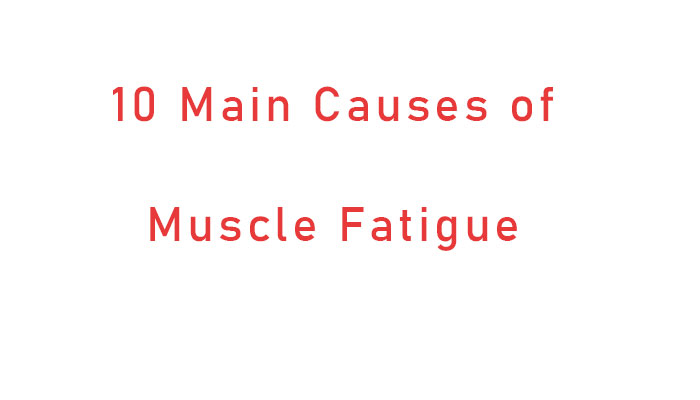
Muscle weariness is more than just a little irritation; it’s a clear signal from your body that something is wrong. Understanding the core causes of muscular exhaustion is critical for everyone who is a top athlete, a fitness fanatic, or works physically demanding tasks. Ignoring it can result in poor performance, prolonged pain, or even damage. Here are the 10 most common reasons of muscular exhaustion as well as a straightforward path to healthy recovery.
1. Lack of Proper Nutrition
Muscles require fuel. If you don’t feed your body the proper nutrition, it will degrade faster than it should. Carbohydrates are the main source of energy during exercise. If you are low on carbohydrates, your muscles will quickly weary. Protein is essential for muscle repair and maintenance.
Prioritize a well-balanced diet. Consume complex carbohydrates (oats, quinoa, sweet potatoes), lean protein (chicken, fish, legumes), and healthy fats (avocados, almonds, olive oil). Don’t work out on an empty stomach.
2. Dehydration
Water is necessary not only to quench thirst but also for muscular function. Even a little decrease in hydration might result in decreased performance and muscular cramps.
Stay hydrated all day, not just during workout. Aim for at least 2 – 3 liters of water every day and more if you sweat excessively. Electrolyte drinks can be beneficial after strenuous workouts.
3. Overtraining
There is a narrow line between pushing yourself and going too far. Overtraining causes physical exhaustion, mental burnout, and a higher change of injury. Your muscles require time to heal, regenerate, and strengthen.
Schedule rest days. Incorporate active recuperation techniques such as walking, gentle yoga, or stretching. Listen to your body, fatigue that lasts more than 48 hours is a red flag.
4. Lack of Sleep
Sleep can’t be negotiated. This is when your body heals damaged tissues and regenerates energy reserves. Poor sleep reduces muscle repair and performance.
Get at least 7 – 9 hours of quality sleep every night. Establish a regimen, limit screen time before bed, and improve your sleeping environment for slumber.
5. Electrolyte Imbalance
Your muscles require a balance of sodium, potassium, calcium, and magnesium to contract and relax correctly. Imbalances cause cramps, spasms, and early weariness.
Include electrolyte-rich foods such as bananas, spinach, sweet, potatoes, and almonds. Consider adding an electrolyte supplement to your lengthy or vigorous workouts.
6. Weak Blood Circulation
Inadequate blood flow implies your muscles aren’t getting enough oxygen and nourishment. This results in faster lactic acid buildup and an earlier onset of fatigue.
Improve your circulation with cardio, dynamic stretching, massage therapy, and correct warm-up activities. Compression clothing can also help increase blood flow.
7. Low Iron Levels
Iron is necessary for oxygen transfer in the blood. Low iron levels mean less oxygen is delivered to your muscles which leads to faster exhaustion. This is especially prevalent among menstrual people and endurance athletes.
Consume iron-rich meals such as red meat, leafy greens, lentils, and fortified cereal. Pair with vitamin-C rich foods to improve absorption. If necessary, see your doctor about supplements.
8. Lactic Acid Buildup
During strenuous workouts, your muscles produce lactic acid faster than your body can eliminate it. This increase adds to the burning feeling and muscle fatigue.
Use interval training to improve your lactate threshold. Maintain consistency with workouts and use good breathing techniques to increase oxygen intake.
9. Inadequate Warming Up and Cooling Down
Jumping right into vigorous exercise without warming up or stopping suddenly without a cool-down puts your muscles under extreme strain. This leads to increased tiredness and injury risk.
Always begin with dynamic stretching or light aerobics. Finish with static stretching and foam rolling to enhance recovery and relieve muscle tension.
10. Stress and Mental Fatigue
Yes, your thinking plays a significant impact in muscular performance. Chronic stress raises cortisol levels, reducing muscle recovery and energy levels.
Meditation, writing, breathing exercises, and therapy can all help you manage stress. In terms of total performance, mental tiredness can be just as detrimental as physical exhaustion.
How to Recover from Muscle Fatigue?
Recovery isn’t a luxury; it is a necessity. If you’ve reached your limit due to muscle tiredness, don’t keep going. Here’s how to recover stronger.
Prioritize Sleep and Rest
You can’t rush recuperation. Sleep is the most important aspect in mending muscle tissue. Plan rest days into your weekly schedule and never underestimate their usefulness.
- Get at least 7 – 9 hours of sleep.
- Use power naps (20 – 30 minutes) for faster recuperation.
- Prioritize rest days for optimal improvement.
Hydration + Electrolytes
Rehydrate vigorously, especially after excessive sweating. Add a bit of salt or use natural electrolytes such as coconut water.
- Drink water throughout the day, not just after exercise.
- Consider taking magnesium, calcium, and potassium supplements as needed.
Active Recovery
Low-intensity exercise boosts circulation and relieves stiffness.
- On rest days, do walking, stretching, or gentle yoga.
- Foam rolling and massage guns can assist to break up muscle knots and promote blood flow.
Nutrition for Recovery
Feed your muscles correctly. Consume protein and carbohydrates within 30 – 60 minutes of finishing your workout.
- Aim for 20 – 30 grams of high-quality protein e.g. whey, chicken, tofu.
- Incorporate anti-inflammatory foods such as berries, leafy greens, turmeric, and fatty salmon.
Use Supplements Wisely
Supplements aren’t a cure-all but they can help in healing.
- Creatine replenishes ATP and feeds muscular contractions.
- BCCAs promote muscle regeneration and minimize soreness.
- Omega-3s help reduce inflammation and speed up healing.
- Before beginning any new supplements, always talk with your healthcare professional.
Heat and Cold Therapy
Contrast therapy (alternating hot and cold) increases circulation and alleviates discomfort.
- Ice packs can relieve inflammation soon after intense workouts.
- Heat such as hot baths or heating pads can help release stiff muscles a day or two later.
Massage and Physical Therapy
Professional massages increase muscular suppleness and remove waste products. If you suffer from persistent weariness, consult a physiotherapist to determine the root cause.
Mind/Body Techniques
Recovery is more than just physical. Your nervous system also requires a reboot.
- Use deep breathing or awareness to relax the body.
- Progressive muscular relaxation can relieve both physical and emotional tension.
Muscle weariness is a signal, not a weakness. Ignoring it leads to setbacks, injuries, and poor performance. By diagnosing the underlying cause and taking deliberate actions to recuperate, you position yourself for actual gains, enhanced endurance, and long-term strength. Listen to your body, train intelligently, eat appropriately, and get enough of rest. That is the roadmap for optimal performance.

Leave a Reply